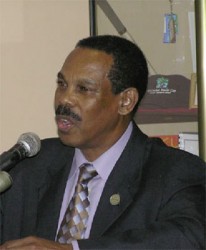UN Secretary-General Envoy for HIV and AIDS in the Caribbean, Dr Edward Greene, has pleaded for the removal of discriminatory immigration laws in Trinidad and Tobago that prohibit the entry of homosexuals.
A release from the Caricom Secretariat said that Greene made the plea in a congratulatory message read at the launch of a book: HIV and Human Rights: Legal and Policy Perspectives on HIV and Human Rights in the Caribbean, edited by Sir George Alleyne and Prof Rose-Marie Bell Antoine, on October 22, in Trinidad and Tobago. Dr Greene noted that the book offered an appropriate launching pad for taking forward a constructive agenda on human rights, for which the PANCAP ‘Justice for All’ Programme would be a major beneficiary.

Gay activists across the region were unable to attend the launching because of the Trinidad law. A legal challenge has been mounted to it.
Newly appointed Caricom Assistant Secretary-General for Human and Social Development, Dr Douglas Slater, in delivering the feature address, noted that the launch of the publication was significant in “the Caribbean’s continuing struggle to address the issues of human rights for its people and was “stimulating a movement from ideas to action.” He said, “The ideas and recommendations [in the book] contain the policy guidance and direction for the political decision makers and … create awareness and understanding of the critical issues required for the change that this Region needs, for the sake of humanity.”
The release said that in her response co-editor, Prof Bell Antoine, Dean of the Faculty of Law of the University of the West Indies, paid tribute to Sir George for his leadership in convening the 2010 symposium, from which the book is an outcome. “This was true dialogue, which will make a valuable contribution to policy,” she said. She also paid tribute to the late Robert Carr and noted that “his compelling voice lived through the text.”
Co-editor, Alleyne, Chancellor and Professor Emeritus, UWI, in his response pointed out the rhetoric of Caribbean constitutions stating, “If rights were to be abrogated this should be possible through constitutional change.” He noted, “The only countries in the Western Hemisphere which criminalise homosexual sex in private are in the Caribbean … and the only way of changing, it seems, is through litigation.” Alleyne pointed out that the book indicated the additional work to be done and would be of optimal utility, if it plants “in the mind of the young that stigma and discrimination is not in the best interest of the Caribbean.”
The release said that in his remarks, Director of the UNAIDS Regional Support Team in the Caribbean, Dr Ernest Massiah referred to the independence address by Dr Eric Williams, the late Prime Minister of Trinidad and Tobago, on the issue of democracy vis à vis intolerance to others. The intolerance referred to then was due to considerations of race, colour, creed, national origin, previous conditions of servitude or other irrationality, he stated. “In 2013, those irrationalities are the stigma of HIV and the issue of sexuality” and “the challenge is how to change that irrationality.”
Dr Massiah said that the book puts out very clearly the route/rules to undertake this change. He revealed that UNAIDS had commenced plans to move the narrative of the book beyond this audience and would create some short YouTube videos, in the first instance.
The release said that Justice Saunders of the Caribbean Court of Justice who was presented with a copy of the book, in brief remarks called for judicial officers to be exposed and sensitized to these issues. He noted that the expansion of human rights throughout the Caribbean was on the agenda of the Caribbean Association of Judicial Officers.
The book launch was chaired by PANCAP Director, Dereck Springer, who said that the publication “helps us to understand the journey we have taken over the past 20 years… and was a launching pad for taking forward the human rights issues.”
The launch was part of a three-day PANCAP Meeting of National AIDS Programme managers and key partners to strengthen and further harmonise the Caribbean AIDS Response, the release added.




